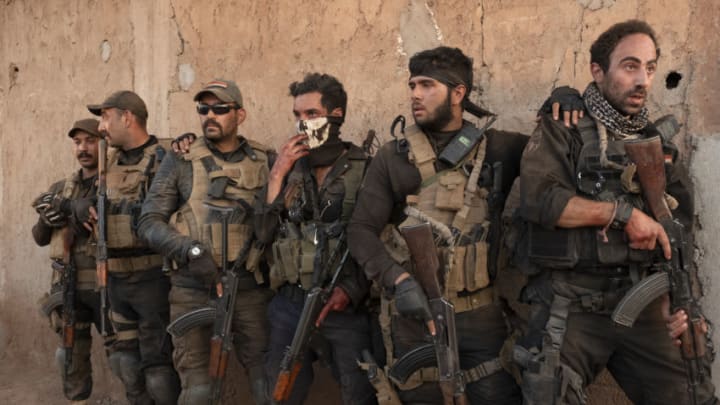Mosul producers Anthony Russo and Mohamed Al-Daradji tell Netflix Life how the film gets personal for them.
For some on the outside, the perils of war may feel distant. Perhaps the idea of “war” may feel like something you see on the news or what you’d play in a video game campaign. And for many, the raw reality of said phenomenon is never a lived experience, so you disconnect and don’t think twice about it.
That’s where the Matthew Michael Carnahan-directed film Mosul comes in. Produced by brothers Joe and Anthony Russo (Avengers: Endgame, Extraction) and executive produced by Mohamed Al-Daradji, Mosul puts war into perspective for everyone. Based on a true story, the film takes place in the war-torn city of Mosul in Iraq and follows an Iraqi cop, Kawa (played by Adam Bessa, also from Extraction), who gets swept up in a rogue mission with the Nineveh SWAT team.
While as not to give everything away about the movie, the mission largely remains a mystery for a majority of the film — aside from one side mission, which is to liberate part of the town of which ISIS still has a hold on. But one thing that easily becomes apparent in the story is that the stakes are high, and emotions run even higher.
Netflix Life got the chance to ask the producers of the movie about the emotional stakes in the film. In a Zoom roundtable interview, both Russo brothers and Al-Daradji were in attendance, and they all understood that emotion was one of the most fundamental parts of the film. In one scene, for example, two brothers are torn between the choice of honoring a dead relative and taking them to the border or safely crossing with the SWAT team but abandoning the relative. In another scene, we see a mother breakdown in tears as her child is sniped down on the street in cold blood for no reason.
Just from those instances alone, you see the movie does an excellent job in adding that emotional layer to the film. Even if you haven’t experienced something as tragic as that yourself, you begin to understand that this is more than the events you hear about in the news or in other stories. When asked about how he related to the film, the experience was extremely personal for executive producer Al-Daradji. Here’s what he had to say:
"When I read the script, when Matthew sent me the script… it was late in the night here in Baghdad, and I started to read it… I wanted just not to finish it because I was so emotional with it. And it was really making me cry, the script, like how [it] was really emotional. And through the journey of those teams, it’s like a band of brothers.I know people in Mosul — real soldiers that we lost, friends and family, relatives. And we lost them, they were killed– or most in battle. And I met a lot of SWAT teams before this film, and I made a short documentary about them. But when I read the script, I was so attached to it, and I felt like it is [my] duty for me to walk in this not as a filmmaker, but as an Iraqi to work in this film because it was so emotional. And Mat did an amazing job when he wrote the draft of the script."
And while the Russos have an extremely different lived experience than the executive producer, Anthony Russo felt, as well, that the movie (at its core) had a message of relatability that could resonate with anyone. Anthony Russo told us in his response:
"We all had different emotional triggers that brought us into the story. Mohamed’s is the most personal, of course. I mean, for me, it was, again, when I read about parts of the world– Joe and I are sort of obsessed with global politics and social conditions around the world, and it’s something we like to explore in our storytelling. But when I read about parts of the world that are sort of like subjected to levels of violence that we just don’t experience in our lives, when you live in a country that’s, sort of, where those conditions don’t exist, it becomes very hard for me to really understand what the dynamics are in a place like that.And this story, really, like… that was the big breakthrough for me at an emotional level, is I really got to think about it from a very specific human level. And that, I think, was like revelatory to me in terms of: be able to understand the experience, identify with the experience, sort of be empathetic with the experience — that road of just understanding the people in a very personal, specific way."
Movies about war may not be for everyone. But when it comes to Mosul, it doesn’t feel like your average war movie. Yes, it is heavy on the action at times. But there are also moments where you get to laugh and smile. Some moments you may mourn or even want to cry. And for any movie, being able to reach into that emotional component is always the key. So for a story that’s packaged as a war film on the outside, you just may be surprised by the emotional journey that you go through by the end. It’s an eye-opening experience — and one that’s bound to make the audience look at the world differently, and hopefully with a little more compassion.
Mosul comes to Netflix on Nov. 26.
